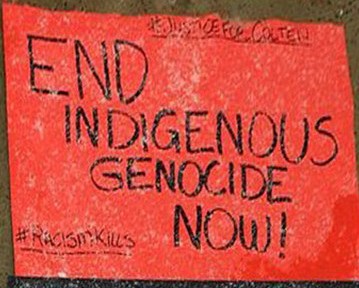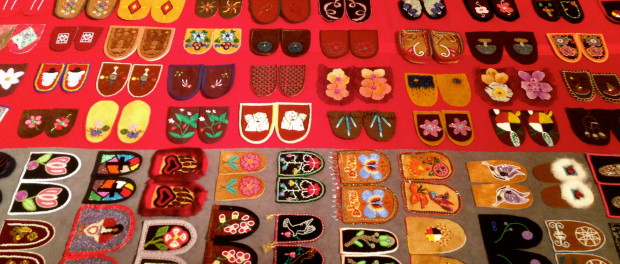Report of National Inquiry into
Missing
and
Murdered
Indigenous Women and Girls
An Urgent Call for Action
- Pauline Easton -

Gathering in Vancouver February 14, 2019, at the beginning of this
year's Memorial
March honouring Missing and Murdered Indigenous Women and Girls.
The National Inquiry into Missing and Murdered
Indigenous
Women and Girls said the evidence it gathered led it to conclude
that missing and murdered Indigenous women and girls were the
victims of a Canadian genocide.
The Introduction to the report said: "This genocide has
been empowered by colonial structures evidenced notably by the Indian Act, the Sixties Scoop,
residential schools and breaches of human and Indigenous rights,
leading directly to the current increased rates of violence, death and
suicide in Indigenous populations." In the section on Findings,
the report said, "Indigenous women, girls, and 2SLGBTQQIA people
continue to experience social and economic marginalization and
exclusion as a direct result of colonialism and of racist and sexist
government policies. This marginalization and exclusion is the
objective of the colonial policies of the Canadian state. Colonial
policies violate the social, economic, and political rights of
Indigenous women, girls, and 2SLGBTQQIA people, and jeopardize their
rights to human security and, in turn, safety. These colonial policies
are tools of genocide."
The inquiry cites contemporary scholarship on genocide
to
support its finding. It published a supplementary report posted
on its website on the legal definition of genocide and its
application to Canada.
 Not a few media,
pundits and politicians have contested this finding. Their response is
disturbing on many levels, but none more so than the anxiety it causes
because it seeks to divert the discourse into a racist morass which
blames the people for their plight. Some media coverage of the release
of the National Inquiry's final report highlights the Liberal
government's failure to address the historical crimes committed by the
Canadian state against the Indigenous peoples. Meanwhile, the response
of the Trudeau government is also informed by the ongoing colonial
relations and decision-making process it imposes on the Indigenous
peoples to this day. As its first violation of principle in the
relationship with the Indigenous peoples, Canada refuses to give up the
prerogative powers usurped by the Crown and establish nation-to-nation
relations. It also refuses to provide redress for all the crimes
committed against the people and put in place the conditions required
for the Indigenous peoples to exercise their right to be. Not a few media,
pundits and politicians have contested this finding. Their response is
disturbing on many levels, but none more so than the anxiety it causes
because it seeks to divert the discourse into a racist morass which
blames the people for their plight. Some media coverage of the release
of the National Inquiry's final report highlights the Liberal
government's failure to address the historical crimes committed by the
Canadian state against the Indigenous peoples. Meanwhile, the response
of the Trudeau government is also informed by the ongoing colonial
relations and decision-making process it imposes on the Indigenous
peoples to this day. As its first violation of principle in the
relationship with the Indigenous peoples, Canada refuses to give up the
prerogative powers usurped by the Crown and establish nation-to-nation
relations. It also refuses to provide redress for all the crimes
committed against the people and put in place the conditions required
for the Indigenous peoples to exercise their right to be.
Thus,
the Trudeau government continues to use its rhetoric and takes cosmetic
measures which may or may not alleviate the problems but do, in fact,
maintain the colonial relations and structures which are the tools of
genocide. This is because the narrow private multinational interests
governments at this time serve demand that Indigenous title over use of
land and resources be extinguished.
As
for Conservatives, the record of the Harper government and the "open
for business" approach adopted in Alberta, Ontario, Quebec and
elsewhere shows the business approach they espouse. Anything to do with
rights is seen as "bad for business" to be denied altogether and
negated through deal-making behind everyone's backs. Bernard Valcourt,
who was Aboriginal Affairs Minister from 2013 until the defeat of the
Harper government in the fall of 2015, does not even admit that
Canada's actions against the Indigenous peoples constitute genocide. He
responded to the finding of genocide by the National Inquiry by saying
it was "propagandist."
Experience with other parties which form the cartel
party system shows that there is no way to hold them to account either
as concerns in whose name they will govern. Establishing
nation-to-nation relations with the Indigenous peoples and providing
the wrongs committed against them with redress is a matter of
humanizing the natural and social environments as an expression of
people's empowerment. It is the historic necessity facing Canadians and
all of humanity today.
The
aim of media coverage is to divert attention from this historic
necessity. But while media are busy diverting the issue by debating
whether the definition of "genocide" is appropriate in the
circumstances, Indigenous peoples' demands for immediate redress by the
government that uphold treaty and hereditary rights expose how past
reports and commissions of inquiry and promises of action have failed
to eliminate the colonial structures that are the source of the
problems. These important facts are clearly brought out in the
Inquiry's report.
This
report is the result of the persistence of the Indigenous peoples to
affirm their right to be against centuries-long attempts to manipulate,
divert and finally negate their rights, as well as against the direct
assault of open negation. It is also the result of the support of the
Canadian people and provides Canadians with an opportunity to discuss
these matters, take stock of the situation today and find a way
forward. Indigenous peoples have not only shown resilience and
"patience" throughout the recent history of their affirmation as well
as throughout history but have developed a particular aversion to empty
words, which is very inspiring and at the heart of the situation right
now.
In
this regard, a positive feature of the National Inquiry is the extent
to which it enabled the expression of the voices of the victims of
Canada's colonial, racist, misogynist "justice" system. Very striking
also are the calls for justice which are said to be "legal
imperatives." It is the voices of the people which must prevail when it
comes to defining 1) what constitutes justice and 2) what is meant by a
"legal imperative." Here is where it must be the modern definitions as
determined by the people which prevail, not those imposed by the
colonial legacy where the definitions used by what are called the
liberal democratic institutions serve to deprive the people of what
belongs to them by right.
A
matter of concern to the polity has become how to intervene in the
upcoming federal election in a manner that favours the Indigenous
peoples along with the interests of working Canadians. It presents
Canadians with a perplexing problem precisely because what are called
the democratic institutions do not represent them but rather the Crown
and the colonial relations it continues to uphold. Take for example the
problem of deciding which, if any, of the cartel parties is a better
choice when it comes to righting historical wrongs committed against
the Indigenous peoples. The people are presented with choices which
divide the polity in a manner that does not resolve any problem in
their favour. There are those who defend and seek to perfect the
defunct liberal democratic institutions for which the conditions no
longer exist and those, like Trump and others of his kind in Canada and
abroad, whose actions leave little doubt that their aim is the outright
destruction of these institutions at the expense of the people. Neither
is an option. The peoples must continue to lay the claims on society
which they must, as the Indigenous peoples have so valiantly done to
the extent they were able through the National Inquiry, and by doing
so, the way forward to build the kind of democratic institutions which
are so much needed and so much lacking today will continue to emerge.
Using
their speech and other forms of action to lay the claims that they must
is something the people can count on. The people can count on
themselves and this is the way forward today.
With Our Deepest Respects




This article was published in

Volume 49 Number 21 - June 8, 2019
Article Link:
Report of National Inquiry into
Missing
and
Murdered : An Urgent Call for Action - Pauline Easton
Website: www.cpcml.ca
Email: editor@cpcml.ca
|